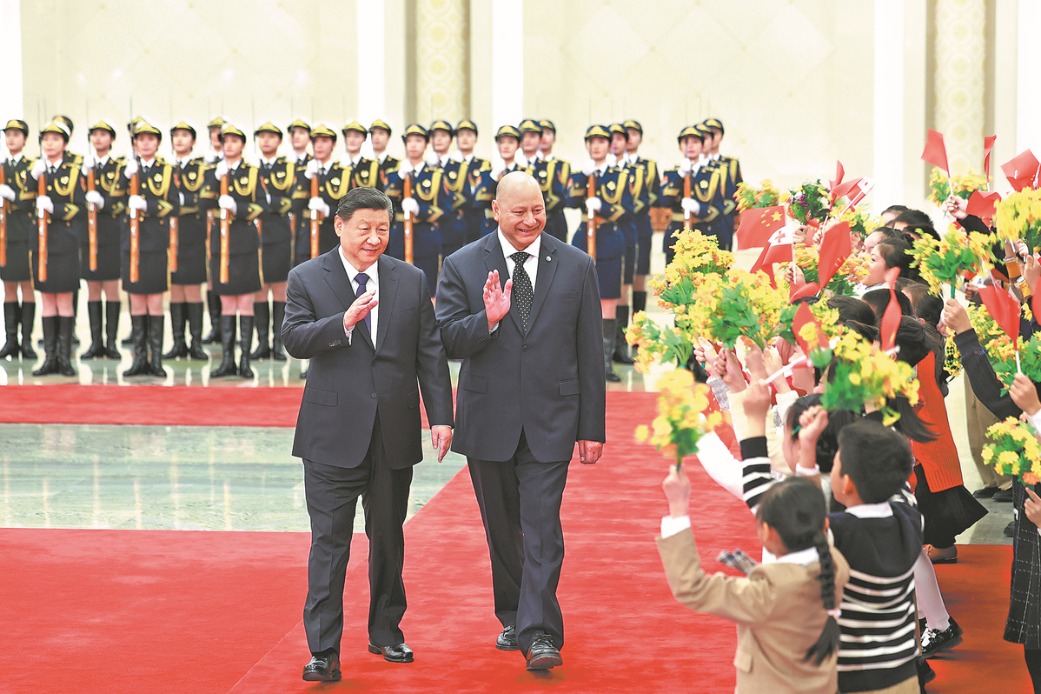A TV series viewers can bank on
Relationships at remote subbranch provide audience with a dividend of interest, Xu Fan reports.

Thriving in the banking world isn't just about numbers — it's about noticing the details.
That's how Lin Qiang, portrayed by actor Bai Yu in the popular TV series Bank on Me, showcases this skill on his first day as the newly appointed deputy head of a modest-sized subbranch of a major bank.
In a short amount of time, Lin identifies an elderly visitor dressed casually as his target customer. By observing the differences in the way he wears his shoes, Lin accurately deduces — sort of like Sherlock Holmes — that the man is a frequent golfer and is accustomed to his feet adopting a specific angle of play. Engaging the customer in conversation about his hobby, Lin quickly gains his favor and successfully sells a wealth management product worth 700,000 yuan ($98,305) within five minutes.
This scene is one of the most talked-about plotlines of the TV series on major social media and review platforms like Douban. Comprising a total of 26 episodes, it has been airing on CCTV-8, the television drama channel of China Central Television, since Aug 18.
Under the helm of Shen Yan, Magnolia Award best director winner at the 23rd Shanghai TV Festival, the drama is written by veteran playwright Zhang Ting, an award-winning scriptwriter known for acclaimed dramas such as Wild Bloom and The Long River.
Loosely based on an online novel, the story follows Lin, a former deputy general manager at the credit approval department of a major bank. After a falling-out with his superior, he is transferred to a remote subbranch.
Despite this setback, Lin excels by creating an investment program for college students to better utilize pocket money and securing a large loan for a local fishing company. As he investigates a questionable loan, Lin becomes entangled in a web of mysteries.
Zhang tells China Daily that he was inspired to write the script because he developed a strong interest in the online novel Qian Tu (literally, "a career in money"), on which the TV series is based.
"The novel is written entirely from an insider's perspective, offering those of us whose main interaction with a bank is likely just for getting cash or saving money, a fresh and in-depth view of the financial world. It's like being invited into the kitchen of a restaurant to see how the dishes are prepared," Zhang explains.
During the preparation process, Zhang and his fellow creators visited several banks, engaging in detailed conversations with the presidents as well as staff members at various levels, and thoroughly studying terminologies and industry regulations, as China launched a new financial regulatory reform last year.
Yan Jin, the chief producer, echoes that the intensive research and interviews have provided many inspirations for the plotlines. Besides, they also recruited a professional to supervise all the details, ensuring that the dialogues and props accurately reflect reality in the financing sector, she adds.
Zhang says, "The financial mechanism is complicated and intricate. However, it can be easily understood by examining human nature."
The fraud and corruption cases featured in the series revolve around desire and greed, illustrating how individuals are tempted to exploit vulnerabilities and loopholes for illegal gain, he adds.
A fresh highlight — the drama also reflects a trendy change in China's workplace, showing how the young generation born between the 1990s and the 2000s no longer handles office relationships or listens to bosses as obediently as their predecessors.
"The thousands of years of culture and tradition in China have, in a sense, formed a society based on personal relationships. Many things are not necessarily done strictly according to rules, but rather based on personal connections and relationships," says Zhang.
However, now young people are reluctant to exhaust their time and energy on cultivating relationships and instead prefer to focus on doing their work following regulations and rules. This demonstrates that China is experiencing a shift in social dynamics, moving away from reliance on personal relationships toward a more rule-based approach. "It's really a good change," says Zhang.
A storyline that reflects this transformation is when Lin, the protagonist, first arrives at the subbranch and encounters difficulties with Zhang Jiaming, a 50-something assistant and right-hand man of the president. Despite lacking banking expertise, Zhang Jiaming is skilled in flattery, famously going as far as personally tasting pet food to impress his boss. Utilizing his manipulative tactics, he unjustly distributes bonuses among his colleagues despite not contributing any real effort. Through determination and cleverness, Lin manages to confront the president, reform the bonus distribution system, and rectify the unfair practices.
"The drama will be released overseas in the future. We also hope that foreign audiences can see from the drama the changes and progress in China, witness the spirit of contemporary Chinese youths who are determined to strive forward in the complex workplace environment, and who have the courage to speak out against injustice and unfairness," says Yan.
"We hope that foreign audiences can feel a contemporary China full of vitality, creativity, and a sense of responsibility," she adds.
Li Weixu contributed to this story.


Today's Top News
- Xi extends congratulations on Intl Day of Solidarity with Palestinian People
- Foreign biz circle bullish on China's opening-up
- Era of China being bullied long gone
- Hong Kong, Macao to get more support
- Emergency space mission accomplished
- Japan blasted for continuing to defend remarks






























